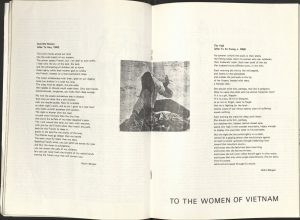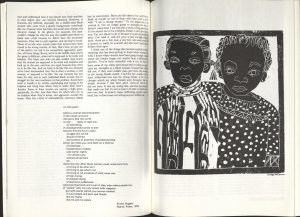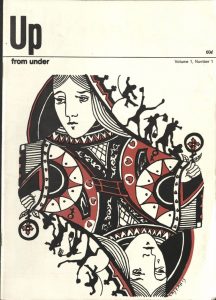Up From Under, a feminist periodical “by, for, and about women,” published five times between 1970 and 1973, traces the entrance of Third World narratives into the larger Feminist Poetry Movement. Over time, Up From Under included more information about Third World women, though these articles and poems remain scarce. In all five publications, there are only four poems about Third World women; only one of these poems is written by a woman of color. As the white feminist editors of Up From Under included more prose and poetry about Vietnamese and Black women, they often misinterpreted and manipulated these narratives.

Robin Morgan’s poems, “Guerrilla Woman” and “The Vigil,” published in Up From Under, vol. 1, no. 1.
Two Robin Morgan poems, boldly addressed “To the Women of Vietnam,” lie in the centerfold of Up From Under, vol. 1, no. 1, published in 1970. In “Guerrilla Woman,” a Vietnamese woman waits for her lover to return from the war while she digs ditches “for the French when they march this path, / beds for the French to sleep in, / graves in the land for the enemy of the land” (lines 4-5, 21-24). In the distance, she hears “the whimpering of children left at home” as her hands become “blood-lotioned, ice-gloved” (5, 12). Similarly, in “The Vigil,” a young pregnant woman waits expectantly as “her husband hunts different prey, in the hills,” fighting in the Vietnam War (4). Hoping for his return, seeing him only “behind closed eyes,” she gives birth and finally realizes that her husband will never return home from the war that has killed him (20). In both poems, written by a white woman, Vietnamese women become living victims whose physical bodies bear the pain of a devastating war. Morgan’s poems are the only mention of the Vietnam War and of non-American women in vol. 1, no. 1 of Up From Under.
The next two publications of Up From Under feature more writing about the Vietnam War, including Betty Thomas Mayhen’s poem “To My Black Sisters,” printed in Up From Under, vol. 1, no. 3, in 1971. In “To My Black Sisters,” the speaker, a white American mother, addresses Black mothers whose sons are also fighting in the Vietnam War, simply stating: “Our sons are dying together / Not here where you and I were always divided, / but in some distant place against another colored people” (1-3). To the speaker, white and Black women, and their children, have always been divided in America, and she acknowledges her own role in this division, admitting that “in my whiteness I looked away from your Black womanhood” (9-10). Finally, she wonders: “How many crimes and corpses must I view to rid myself / of a whiteness not human, / Before I dare reach out and touch your hand” (17-19). As this speaker comes to terms with her own racism, her own mistreatment of Black women and their children, so does Up From Under. Although this poem is written by a white woman, it represents a shift in Up From Under as the editors try to “reach out and touch your hand”—and unite with American women of color (19).

“no title poem,” formatted next to an article and an image in Up From Under, vol. 1, no. 4.
In Ericka Huggins’s “no title poem,” printed in vol. 1, no. 4 of Up From Under in 1971, the speaker writes about the world “if you’re black and poor and female / like my mama / like me and my sisters”—a world that is “ready to rape you / of everything” (28-30, 4-5). Huggins writes this poem from the Niantic Prison in 1970, and her speaker also realizes that “prison can make you look back on a lifetime / of bitterness…” (11-12). This poem appears in a section dedicated to Black women, wedged between essays “Who I Am” and “From One Generation to Another.” The works, grouped together because they are about Black women, demonstrate a larger trend of Up From Under. In each publication, the editors include exactly two, four, or six pages on women of color, including Vietnamese and Black women; clearly, these women are deemed “other” enough to constitute their own sections, separate from the rest of the writing about white women. This formula contributes to the tokenization of women of color throughout all of Up From Under. In this publication, just like the Feminist Poetry Movement, American white women too often minimized women of color and their poetic voices.

The cover of Up From Under, vol. 1, no. 1, published in 1970.

The cover of Up From Under, vol. 1, no. 5, published in 1973. This cover features images of both white and Third World women, demonstrating the progression of Up From Under.
Sources:
Huggins, Ericka. “no title poem.” Up From Under, vol. 1, no. 4, 1971.
Mayhen, Betty Thomas. “To My Black Sisters.” Up From Under, vol. 1, no. 3, January 1971.
Morgan, Robin. “Guerrilla Woman.” Up From Under, vol. 1, no. 1, May 1970.
Morgan, Robin. “The Vigil.” Up From Under, vol. 1, no. 1, May 1970.
Up From Under, vol. 1, no. 1, May 1970.
Up From Under, vol. 1, no. 2, August 1970.
Up From Under, vol. 1, no. 3, January 1971.
Up From Under, vol. 1, no. 4, 1971.
Up From Under, vol. 1, no. 5, 1973.
